Chinese Oil Refiners May be Unwittingly Paying for Houthi Attacks
Houthi forces depend heavily on Iranian support, and Iran finances its foreign military operations with oil sales to China

Over the weekend, Yemen's Houthi rebels continued to launch drone attacks on vessels in the Red Sea. U.S. forces shot down two unmanned aerial vehicles on Saturday morning, one on shore as it prepared to take off and another over the Red Sea, according to U.S. Central Command.
The Houthi movement has pledged to keep up its attacks until fighting in Gaza comes to an end, and it remains a costly menace to shipping. The group has sunk one ship and damaged another, without appearing to differentiate between nationality of vessels. Earlier this month, Houthi fighters repeatedly targeted a tanker owned by a firm with a Hong Kong address, appearing to violate a pledge not to attack Chinese ships. Given the seemingly indiscriminate threat of attack, almost all east-west container traffic has abandoned the Red Sea-Suez route, and tanker and ro/ro traffic has partially diverted as well.
Though the disruption would appear to harm Chinese business interests on the China-Europe trade lane, Beijing has not joined any of the ongoing maritime security operations in the Red Sea. China also appears to be indirectly financing the Houthis' campaign of maritime attacks, multiple analysts told Politico, whenever its independent refiners buy another cargo of oil from Iran.
China's small "teapot refiners" buy about 80-90 percent of all Iranian oil exports, and they turn the discount oil into competitively-priced gas and diesel for the Asian market. Since Iranian petroleum is sanctioned by the United States, the sale and transport take place with a degree of subterfuge. The oil cargoes are typically transshipped in a third country and imported as though the oil originated somewhere else. (China's imports of "Malaysian" oil routinely exceed Malaysia's national oil production.)

that matters most
Get the latest maritime news delivered to your inbox daily.
Some of these Iranian cargoes are sold under an allotment program for the Islamic Revolutionary Guard Corps-Quds Force, the U.S.-designated terrorist organization that is responsible for Iran's covert action programs. Much of the Quds Force's oil proceeds go towards training and equipping Iranian proxies - including the Houthis. U.S. Navy forces have repeatedly intercepted shipments of Iranian missile components to Yemen, and Western analysts believe that the Houthis' anti-ship capabilities depend heavily on Iranian technology.
"The first country hurt by [Red Sea disruption] is China itself,” one official told Politico. “I’m not sure they’re aware they’re cutting off the branch they're sitting on.”
